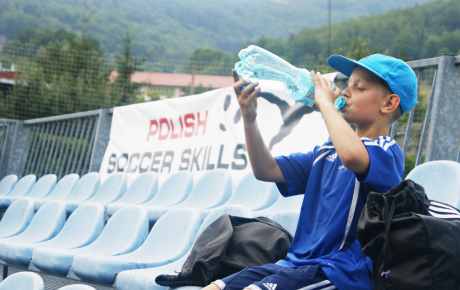Many young players at the beginning of their sport path meet some nutrition limitations resulting from various reasons among others from a smaller amount of time, availability of the products, dietary tastes, match stress. How to handle them?

Many young players at the beginning of their sport path meet some nutrition limitations resulting from various reasons among others from a smaller amount of time, availability of the products, dietary tastes, match stress. How to handle them?
I don’t like it, I don’t want it
A sportsman who limits himself to few products only, in a difficult situation (tournaments, foreign gatherings) may not provide enough amount of energy and nutrients needed to perform.
Dietician’s tip: Eat varied meals, try new tastes. Young sportsmen should develop the flexibility of their food choices to be prepared for unexpected situations while travelling. Be open! This week try food you haven’t liked before. Remember! Our tastes change with age, maybe this time you will take a liking to it.
Angry young sportsman
For many young sportsmen, matches cause great stress which can result in total exclusion of the post-match meal.
Dietician’s tip: You will perform better if you are full and properly hydrated. Sportsmen need to experiment to find the match procedure most convenient for them. The solution to this can be taking liquid meals, cocktails based on millet/oats with vegetable milk and fruit as well as increasing the list of tolerated foods by adding others.
Time problems
Time constraints, a big amount of trainings/extra classes can negatively influence provision of energy and nutrition components. For many young sportsmen, second meal at school is their pre-training meal.
Dietician’s tip: The sooner you develop the proper conscience of nutrition, ability to deal in difficult situations as well as time management, the better you will cope in the field, regenerate faster and prepare yourself for the next training. Plan your meals the day before, consider storing them in food containers with cooling pads to keep them fresh longer. Examples of meals: sandwiches with peanut butter and jam and natural yoghurt, muesli with fruit and natural yoghurt, sandwiches with turkey and vegetables, wraps with hummus and vegetables. More about pre-training meals you will read HERE.
Skipping breakfast
Breakfast plays a key role when it comes to feeding children and youth. It is the most important meal of the day. Skipping this first meal can have negative consequences on daily nutrient requirements such as reducing the total amount of components needed for growth and development. The breakfast of a young sportsman should be based on products from various food groups to provide energy needed to train, competition as well as growth and development.
Dietician’s tip: Start your day with a wholesome breakfast including carbohydrates, proteins, fats to provide energy needed to study and training. Breakfast example meals: muesli (oats, nuts, linseed) with yoghurt and fruit, frittata with vegetables and wholesome bread, millet pancake with white cheese and nuts.
Meals on the road
Travelling for training purposes or competition is a standard practice for most of the sportsmen. Players need to take right nutrition decisions to keep defined sport goals. For most of them it is a great challenge.
Dietician’s tip: Main strategy is to minimize the discomfort connected with the travel due to limited access to “favourite” products, changes of schedule and at the same time meal hours and their quantity.
To a small portable fridge/food containers with cooling pads pack meals and snacks. Examples of meals on the road: hummus with wholemeal crackers, fruit salad with natural yoghurt; chicken/salmon salad with couscous and vegetables (tomatoes, olives, zucchini), muesli bar, fruit cocktail with yoghurt, walnuts; tortilla with lean ham (turkey/chicken fillet), spinach, parmesan and dry cranberry, stracciatella yoghurt (natural yoghurt with a spoonful of cacao) with strawberries.
Snacks: fruit, dry fruit, chocolate milk, muesli bars, nuts and seeds, fruit juice, natural yoghurt, homemade popcorn, biscuits, fresh-cut vegetables (celery, carrot).